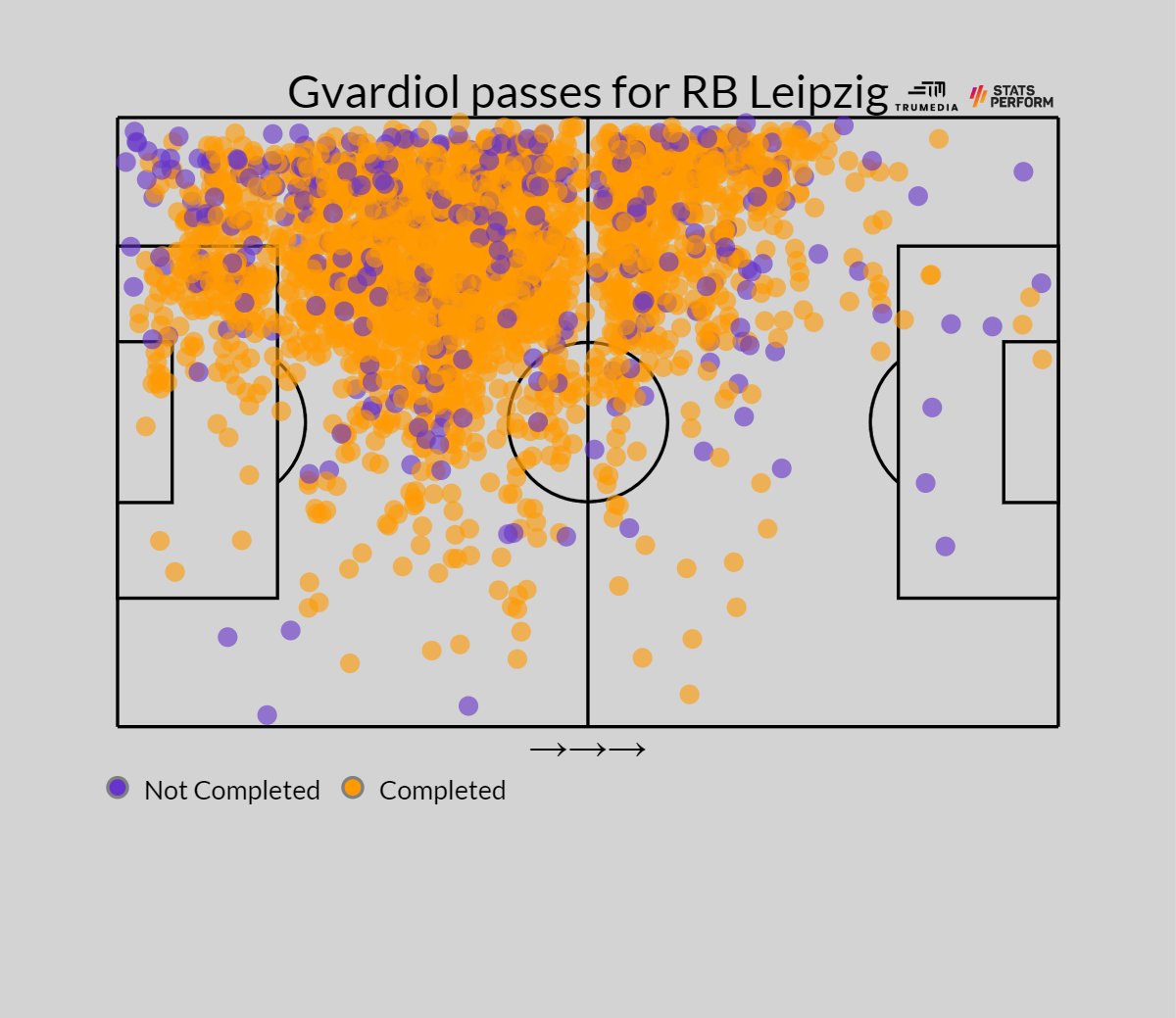Having arrived at the 2022 World Cup with a reputation as one of the most promising young centre-backs in the world, it's no bold claim to suggest that Croatia's Josko Gvardiol (who was No. 22 on ESPN's 39 U21 list in April) has been the outstanding defender of the tournament so far.
Reputations are one thing and delivering on the biggest stage is another, but the 20-year-old left-footed defender -- who has stood out visually by wearing a protective face mask after breaking his nose against Freiburg in November -- has more than lived up to his billing. In a Croatia side that have only conceded two goals (excluding the penalty shootout against Japan), Gvardiol has exuded tremendous confidence and authority in defence -- winning nearly 70% of his duels -- while being safe and constructive in possession.
While it's the attacking players on show at a World Cup that tend to attract the greatest attention -- they operate with the luxury of creative autonomy, being allowed to float, exchange positions and attempt individual actions without suffering match-defining consequences -- Gvardiol has conducted himself impeccably in one of the most demanding roles, where which a sole misjudgement, failed anticipation or positional error can lead to a goal for the opposition.
- World Cup 2022: News and features | Schedule | Squads
Even more remarkably, he is playing in a team that doesn't necessarily scream defensive solidity. His central defensive partner, 33-year-old Dejan Lovren, has plenty of experience but his mobility has decreased with age; whoever plays at left full-back, either Borna Sosa or Borna Barisic, is of an attacking nature which leaves occasional gaps for Gvardiol to attend to.
Meanwhile, with Luka Modric and Mateo Kovacic as creative hubs in the centre of Croatia's midfield, the defensive duties have mainly been left to playmaker Marcelo Brozovic rather than to a ball-winning defensive midfielder or a "double No. 6" set-up, which would usually grant centre-backs added protection.
And, for all his natural talent, it was not a given that Gvardiol would impress at the World Cup at his tender age, or even be playing regularly at centre-back given the other options available.
- Stream on ESPN+: LaLiga, Bundesliga, more (U.S.)
Radu Baicu -- who is a European Scout for Parma and has previously worked for Bayer Leverkusen and Monaco -- came across Gvardiol for the first time three years ago, before the 17-year-old had made his debut for Dinamo Zagreb's first team.
"The first time I saw him was for Croatia at youth level in early 2019," Baicu told ESPN. "That day he played at left-back and it was clear for everyone to see that he was well ahead of other players in his age group physically. He also dealt so well with one-vs.-one situations, just like he does now; resolute and with composure.
"Yet, if you'd said to me that he'd be one of the top defenders at the World Cup only three years later -- moreover as a centre-back -- I wouldn't have believed you for a second."

Among scouts at the time, when height was seen as a pre-requisite for a centre-back, there were a few doubts about the 6-foot-1 Gvardiol which have lingered until recently.
"Back then one would argue that Gvardiol lacked the pace to be an elite left-back, while at the same time being on the short side to succeed fully as a centre-back," Baicu said. "Especially since top clubs then wanted their centre-backs to be as tall as possible. Yet, you could see from how he read the game and conducted himself in one-vs.-ones that he had the basics to get very, very far."
With Gvardiol's growing reputation at youth level and brilliant performances in the UEFA Youth League, it was RB Leipzig that were able to beat other top clubs to seal an €18.8 million transfer in September 2020. The defender stayed at Dinamo Zagreb -- where he had established himself in the first team, mainly alternating between centre-back and left-back -- for the rest of the season before making his German Bundesliga debut in August 2021.
Within a year his transfer value had sky-rocketed, with Chelsea reportedly having a €90m offer to sign him turned down last summer and Barcelona, Real Madrid, Juventus, alongside virtually every other top team in Europe, showing interest. But, having recently extended his contract at Leipzig until 2027, Gvardiol's increasing band of suitors will doubtless have to obliterate the world-record fee for a defender to capture his signature on the back of his performances at the World Cup.
While Gvardiol's composure on the ball and the way he majestically steps out of the defensive line to hit line-breaking passes have steadily improved over the past few seasons, his remarkable technique was in evidence early on.
"What I noticed straight away was his exceptional strike on the ball," Baicu said of his 2019 scouting trip. "In the practically empty stadium you could hear from the sound when he hit a long forward or cross-field pass that something extraordinary was going on. The ball was struck so cleanly, low and flat, with a strength and precision uncommon for a player of that age. I remember looking at my colleague sitting next to me going: 'Wow, what was that?'
"I don't think I've seen a more technically gifted defender at this age."
As with any centre-back, Gvardiol has suffered periods of adverse form -- RB Leipzig's high defensive line can leave the heart of the defence even more exposed -- but after the initial period of adaptation, he has hit a remarkable level of consistency and arguably now finds himself among the top three Bundesliga players in his position.
With another imposing display against Brazil, against the most challenging opposition to date, the Croatian can further consolidate his status as one of the top young defenders in the world and build more hype ahead of what is expected to be a busy January transfer window.
